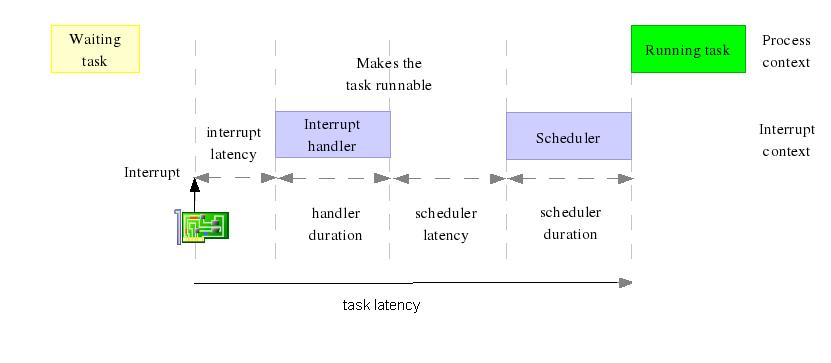Real-time Linux (Xenomai)
Radboud University Nijmegen
Exercise #8: Measuring Jitter and Latency
Note: This excercise is intended for a
real hardware platform, although the program for scheduling measurements could
be tried first on VirtualBox
Introduction
In real-time programming one usually has to guarantee that certain deadlines
are always met. Hence, predictability of timing is crucial. In this exercise we
investigate a few aspects of predictability by measuring scheduling jitter and
interrupt latency.
Objectives
The primary objectives of this exercise are:
- To get experience with timing measurements
- To investigate predictability and timing characteristics of Xenomai by
measure scheduling jitter and interrupt latency.
Description
Terminology
We start with a definition of a number of terms, using a figure from the
presentation Real Time
in Embedded Linux Systems by Petazzoni & Opdenacker:

Interrupt latency: the time between the occurrence of the interrupt and
the start of the interrupt handler.
Scheduler latency: the time elapsed
after completion of the handler and before execution the scheduler.
Scheduling latency, also called task
latency: the time between the occurrence of the interrupt that makes a
sleeping task runnable again and the moment the task is resumed.
Scheduling jitter: the unwanted
variation of the release times of a periodic task. It can be characterized in
various ways such as an interval around the desired release time, a maximal
deviation from the desired time point, or a standard deviation from the mean
value.
Exercises
Exercise 8a.
Write a program to collect data about the periodic scheduling of a task
on a Raspberry Pi and plot this data.
Approach:
- Write a periodic real-time task which is scheduled every 100 microseconds
and which executes 10 000 times. Block the main linux program, e.g., by means of a semaphore.
- At the beginning of each run of the task, read the current time with
rt_timer_read
(which returns a value of type RTIME) and store
this in a global array.
- After having stored 10 000 values, let the main linux program continue to compute the difference between each pair of
successive times (which should be close to 100 000 ns) and store this in
another array. For instance, using a function
void calc_time_diffs(RTIME *time_diff) { ...]}
- Write the array of time differences to a comma separated file
(.csv) of the form:
0,value[0]
1,value[1]
2,value[2]
....
For instance, by means of the function
void write_RTIMES(char * filename, unsigned int number_of_values,
RTIME *time_values){
unsigned int n=0;
FILE *file;
file = fopen(filename,"w");
while (n<number_of_values) {
fprintf(file,"%u,%llu\n",n,time_values[n]);
n++;
}
fclose(file);
}
- Calculate the average of the time differences and print the result.
- Using these functions and
unsigned int nsamples=10000; the main program has the form
...
RTIME *time_diff;
time_diff = calloc(nsamples, sizeof(RTIME));
...
calc_time_diffs(time_diff);
write_RTIMES("time_diff.csv",nsamples,time_diff);
average=calc_average_time(nsamples,time_diff);
printf("average %llu\n", average);
...
- Open the .csv file in a spreadsheet (e.g., in Excel) and plot the data
in a graphic (e.g. a scatter chart) showing the measured value on the y-axis
and the number of the measurement on the x-axis.
Note that the comma in the .csv file should lead to two
columns; if this does not work, maybe because of language settings, try
replacing the comma by ";".
Note: to avoid the influence of startup effects the results might be improved by omitting the first few values.
Exercise 8b.
The breadbord of exercise 7 and the setup of exercise 7b are used to measure interrupt latency by means of three tasks:
Let your program calculate the difference between the arrays of generated and catched interrupts.
Similar to 8a, caculate the avarage value and print it.
Are the results different when the worker task is omitted?
Last Updated: 17 July 2019 (Jozef Hooman)
Created by: Harco Kuppens
h.kuppens@cs.ru.nl
